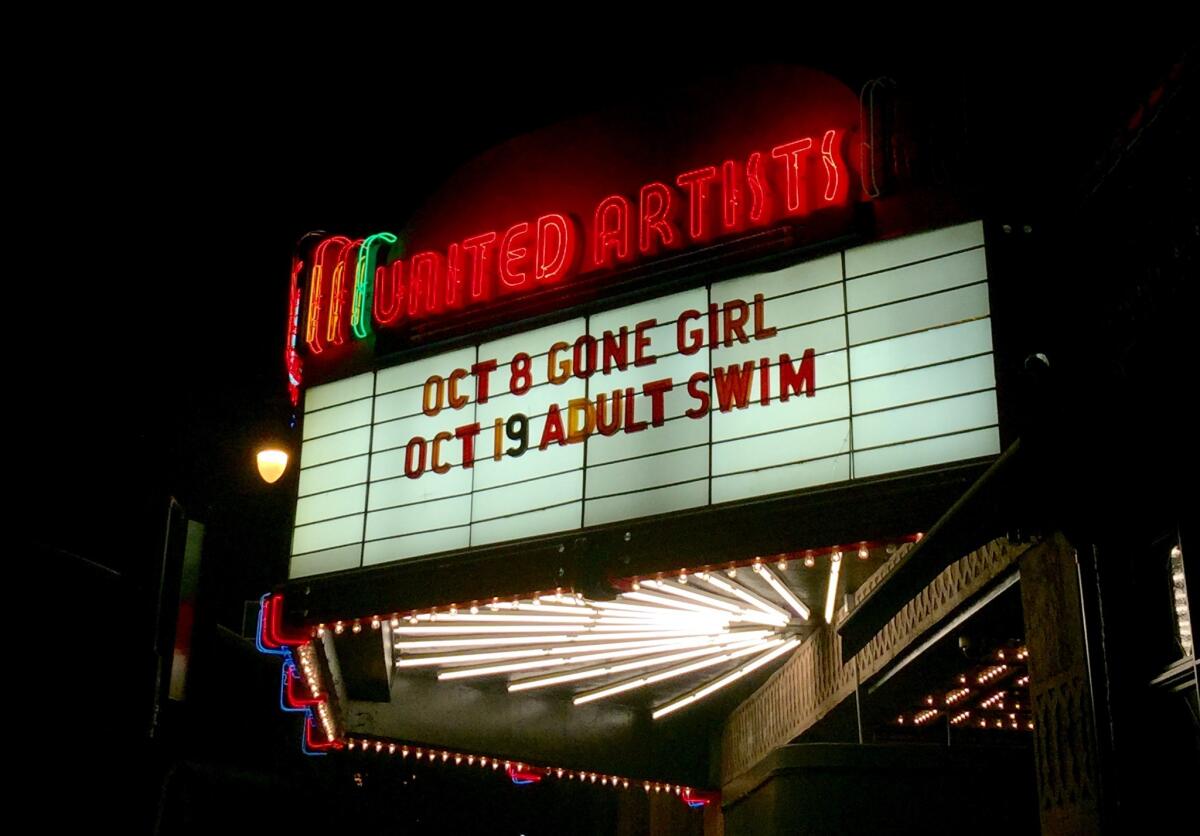5 take-aways from Fincher’s Q&A at ‘Gone Girl’ screening

- Share via
It’s been a good few weeks for director David Fincher.
His new film, “Gone Girl,” based on the blockbuster bestseller by Gillian Flynn, opened Oct. 3 to strong reviews and even stronger box office. It’s expected to be the No. 1 film again this weekend, beating out four newcomers, including the Robert Downey Jr. drama “The Judge.”
So on Wednesday, when Fincher walked on stage after a Film Independent screening of “Gone Girl” at the Ace Hotel in downtown L.A., a packed audience gave him a standing ovation.
The film (and the book) follow Nick Dunne (Ben Affleck) after his wife, Amy (Rosamund Pike), goes missing on their fifth anniversary. As secrets of their marriage unfold, police, media and community members try to determine whether Nick killed his wife.
Sound complicated and a little crazy? Good. That’s what Fincher goes for, most of the time anyway.
The director has a knack for finding the types of films, such as “Fight Club,” “Se7en” and “The Girl With the Dragon Tattoo,” that make viewers do double takes.
During a Q&A with Film Independent’s Elvis Mitchell, Fincher delved into details of the film while cracking jokes (and taking good-natured jabs at Mitchell). Here are five take-aways from the conversation.
1. Fincher was drawn to Flynn’s “interesting and elaborate” book plot.
“You’re looking for something you can kind of grab ahold of,” he said about adapting books into movies.
But what stood out the most for him with “Gone Girl” was the characters’ narcissism.
“I think the thing I was most interested in was the idea of narcissism as a sort of way to hold two people together,” he said, “and the notion that we project the best person of ourselves not only to seduce someone we imagine would be perfect for us but would also be perfect for our narcissistic projection of ourselves.”
“The thing I think Gillian Flynn did that never occurred to me is you could have a movie that’s a mystery and that could hand the baton off to this absurdist thriller and that could hand off the baton and become satire,” Fincher added. “And I thought I’ve never seen that done … so let’s give it a shot.”
2. Fincher loves the “oh, no” movie moments.
“There are plenty of moments where things turn out OK ... where justice is served,” Fincher said. The audience laughed.
“Can you make one of those?” Mitchell joked.
Fincher replied: “I did … actually, no wait. I didn’t.”
For Fincher, movies aren’t necessarily about cheering for the hero.
“It’s not so much the notion of making the hair stand up on the back of your neck,” he said. “I want to see arguments between characters where I agree with both of them. I’m interested in those things where you have a hard time rooting for one side as opposed to the other.”
He later added that the film is “funny because it’s horrifying.”
3. Fincher reached out to Neil Patrick Harris after watching the Tony Awards.
The role of Desi in the book is far more expansive than it is in the film, which made it hard for Fincher to find the right guy for the role.
“I was kind of beside myself. I could not figure out who this could be,” Fincher said.
So the director began envisioning Desi to be like Clare Quilty, the disreputable professor in “Lolita.”
“I started thinking: Whose the most quicksilver, watchable, disruptive kind of energy we could hang this on?” he said. “I turned on the Tonys, and I was like, ‘This guy can make me watch the Tonys. He’s amazing.”
Harris and Fincher met for lunch. Then the new Desi was born.
“Clare Quilty by way of Sting,” Fincher said.
4. The first time Fincher met Tyler Perry, the actor was flying a remote-control plane from the roof of a building.
“I saw this guy on the third floor roof of this building in a track suit with a remote controller and this little plane flying around,” Fincher recalled. “We pulled up and this man came out and said, ‘Mr. Perry will be with you in a moment.’”
Fincher thought Tanner Bolt, the high-powered lawyer in “Gone Girl,” would also make people wait until he finished flying his plane.
It worked out.
“The first time we shot with him was 72 hours after he had wrapped shooting two shows,” Fincher said. “He showed up and he was totally ready to go.”
5. Don’t expect to spot Fincher watching a movie in a theater with you.
The director doesn’t like watching his own films. He admitted he hadn’t watched “Fight Club” for about nine years.
“It’s not that you’re not happy [with the films],” he said. “It’s just you can always make something better.”
In the case of “Gone Girl,” the director said he was “never more aware of how long the scenes were” than at the film’s premiere at the New York Film Festival.
Plus, seeing films with an audience for a first time adds a lot of anxiety.
“It’s like having a caesarian in front of 700 people,” he said. “It’s horrible. It’s like, just cut the cord!”
For more news on the entertainment industry, follow me @saba_h
More to Read
Only good movies
Get the Indie Focus newsletter, Mark Olsen's weekly guide to the world of cinema.
You may occasionally receive promotional content from the Los Angeles Times.











